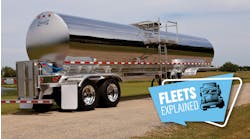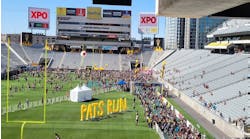Paccar Inc. executives have trimmed their forecast for 2024 U.S. and Canada Class 8 sales of Kenworth and Peterbilt trucks by 10,000 units for the second consecutive quarter and said July 23 that their important Central and Eastern Europe market is softening.
Speaking after Paccar reported its second-quarter earnings, CEO Preston Feight told analysts on a conference call that demand for the company’s vocational trucks remains high thanks to the infrastructure boom and added that the less-than-truckload remains healthy, which is translating into normal buying patterns from customers. However, questions have started to surface on the truckload side of Paccar’s customer base.
See also: History of the 7 major heavy-duty truck manufacturers in the U.S.
“Maybe that’s the part that there might have been an expectation of starting to lift off the bottom at this point,” Feight said, later adding that “the truckload carriers, I think, are trying to decide what their cadence is going to be for the balance of the year.”
The team at Bellevue, Washington-based Paccar began 2024 forecasting that U.S. and Canada Class 8 sales would be between 280,000 and 300,000. They now say they are looking at a range of 240,000 to 280,000.
Globally, Paccar delivered 48,400 trucks in the second quarter, down about 7% from the same period last year. Its U.S. and Canada operations, however, grew its deliveries to 28,700 from 27,500, while weak European markets meant Paccar moved 11,500 trucks compared to 16,400 in Q2 of 2023.
For the third quarter, Paccar’s executives expect total deliveries to fall between 43,000 and 44,000. CFO Harrie Schippers said that estimate “reflects normal truck markets and the regular summer production shutdown in Europe.” Still, the midpoint of that range is more than 13% below the 50,100 vehicles Paccar delivered in Q3 of last year.
“I think you’d have to say we’re in a more normal operating environment right now” than in recent years, Feight said on the conference call about the outlook for the current quarter. “And normal feels healthy and good, but you'd expect the Q3 deliveries to be in that 43,000 to 44,000 range.”
Investors appeared to disagree: The more cautious bits of commentary from Feight and Schippers contributed to Paccar shares (Ticker: PCAR) sliding 11% to $97.10 July 23. That move pushed them into the red over a six-month window—they were changing hands above $120 in March—and leaves the company’s market capitalization at about $51 billion.
A hint of how the freight recession could turn into a headache for Paccar and other original equipment manufacturers came last week from J.B. Hunt Transport Services Inc. That company’s executives said they were encouraged by recent shipping trends but remain cautious about making a broad call. Instead, they told investors and analysts they have slashed J.B. Hunt’s capital spending budget for 2024—which covers trailers and real estate as well as trucks—by between $150 million and $300 million.




